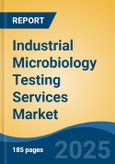Pharmaceutical & Biotechnology is the fastest growing segment, North America is the largest market globally
Speak directly to the analyst to clarify any post sales queries you may have.
10% Free customizationThis report comes with 10% free customization, enabling you to add data that meets your specific business needs.
Key Market Drivers
Stringent regulatory frameworks and quality standards represent a primary driver for the industrial microbiology testing services market, compelling widespread adoption across various manufacturing sectors. Global regulatory bodies like the U. S. Food and Drug Administration consistently update and rigorously enforce guidelines for microbial control, mandating comprehensive testing throughout the production lifecycle. This includes detailed scrutiny of raw materials, environmental conditions, and finished goods to preempt contamination and protect public health. Such regulatory imperatives directly stimulate demand for specialized testing to ensure compliance and mitigate risks.Key Market Challenges
A significant challenge to the growth of the Global Industrial Microbiology Testing Services Market is the substantial financial outlay required for implementing advanced sterility procedures and acquiring specialized testing equipment. These considerable expenditures create a barrier, particularly for small and medium-sized enterprises, limiting their ability to adopt modern microbial detection methods and sophisticated quality control measures. This directly restrains market expansion by slowing the uptake of new testing technologies and restricting service accessibility for companies with limited capital.Key Market Trends
The integration of automation and artificial intelligence in testing workflows represents a pivotal trend, enhancing the efficiency and accuracy of microbial analysis. This technological advancement minimizes manual errors, provides faster results, and facilitates the handling of high-throughput testing demands across various industrial sectors. Artificial intelligence, in particular, enables sophisticated data interpretation and predictive analytics, which are critical for proactive contamination control and rapid decision-making. According to the International Society for Pharmaceutical Engineering's 7th Pharma 4.0™ Survey conducted in 2023, the collective percentage of organizations engaged in "systematic ongoing actions" and "pilots" for Pharma 4.0™ adoption reached 58.1%, indicating a substantial progression in digital transformation within the pharmaceutical industry.Key Market Players Profiled:
- Intertek Group Plc
- Eurofins Spectro India Pvt. Ltd.
- Pace Analytical Services, LLC
- Biotech Testing Services LLP
- Merck KGaA
- TÜV SÜD South Asia Pvt. Ltd.
- Biocare Research (India) Pvt. Ltd
- Charles River Laboratories International, Inc.
Report Scope:
In this report, the Global Industrial Microbiology Testing Services Market has been segmented into the following categories:By Test Type:
- Sterility Testing
- Microbial Limits Testing
- Bio-burden Testing
- Water Testing
- Air Monitoring Tests
- Others
By End-use:
- Food & Beverages
- Pharmaceutical & Biotechnology
- Agricultural
- Environmental
- Cosmetic and Personal Care
- Others
By Region:
- North America
- Europe
- Asia Pacific
- South America
- Middle East & Africa
Competitive Landscape
Company Profiles: Detailed analysis of the major companies present in the Global Industrial Microbiology Testing Services Market.Available Customizations:
With the given market data, the publisher offers customizations according to a company's specific needs. The following customization options are available for the report:- Detailed analysis and profiling of additional market players (up to five).
This product will be delivered within 1-3 business days.
Table of Contents
Companies Mentioned
- Intertek Group Plc
- Eurofins Spectro India Pvt. Ltd.
- Pace Analytical Services, LLC
- Biotech Testing Services LLP
- Merck KGaA
- TÜV SÜD South Asia Pvt. Ltd.
- Biocare Research (India) Pvt. Ltd
- Charles River Laboratories International, Inc.
Table Information
| Report Attribute | Details |
|---|---|
| No. of Pages | 185 |
| Published | November 2025 |
| Forecast Period | 2024 - 2030 |
| Estimated Market Value ( USD | $ 3.89 Billion |
| Forecasted Market Value ( USD | $ 6.16 Billion |
| Compound Annual Growth Rate | 7.9% |
| Regions Covered | Global |
| No. of Companies Mentioned | 8 |









